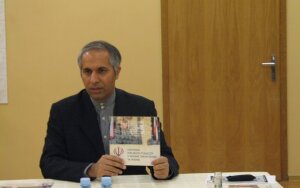- January 15, 2013
- 331
A Gesture of Friendship of the Iranian Nation to the Polish People – The Exhibition “History of Polish Wanderers During World War Two”

In the Polish Community House there will be opened an exhibition named “History of Polish Wanderers During World War Two”, which is meant to commemorate the 70th anniversary of the Polish appearance in Iran in the 1940s. It was designed and prepared by the First Secretary of the Iranian Embassy, Gholamhossein Ebrahimi.
The Polish migrants were not only an army of soldiers, but also civilians. The Polish people, who arrived in Iran in 1941-1945 were not only, as some believe, the army of general Anders, but a large group of ordinary people that accompanied him. Out of the 120 000, who left the USSR and appeared in Iran during the Second World War, 40 000 were women and children – said Gholamhossein Ebrahimi during his press conference. The diplomat underlined that they were predominantly placed in the city of Isfahan, where the first Polish-Iranian relationships were established 700 years ago.
Krystyna Tomaszyk, the author of the book “Droga i Pamięć. Przez Syberię na Antypody”, who was the daughter of Krystyna Skwarko, the headmaster of the schools and dormitories in Isfahan, remembers that in the city lived almost 2500 children, who lived with other Poles that arrived in 27 Polish posts operating in Isfahan.
This great deed of the Persian nation, who helped the Polish children and took care of them, lives on in the memory of next generations. It became a bright ray in the darkness of the tragedy of the whole world, and should remain a part of the history of Two World War – Tomaszyk wrote in her letter to the organizers.
Some of the Polish migrants, including children, emigrated to the antipodes, invited by the prime minister of New Zealand. Those members of the community who are still alive remember and commemorate their stay in Iran.
The diplomat pointed out the fact that some Iranian bear, which was later called Wojtek and became the symbol 22nd Procurement Company of Artillery during the war. The Polish soldiers bought the bear from an Iranian child on their way through the city of Hamadan. Wojtek accompanied them as long as the battle of Monte Cassino and occupied a special position in the company. Interestingly, he was later an inspiration for the designer of the emblems of the company. The soldiers of the 22nd company, in order to commemorate their stay in Iran, bought a plot of land near the Polish embassy in London, which later became a house of memory, where various reminders of it were put.
Indeed, the history of the Polish wanderers in Iran stems from the agreement between Stalin and the Polish government-in-exile signed in 1941, according to which the Poles that had stayed in the camps of labour in USSR were to be set free, selected and training under the supervision of Władysław Anders, and later sent to the front. Owing to the circumstances that were independent from the Polish, the army of Anders left the Soviet Union and arrived in Iran – says the brochure prepared by Ibrahimi.
The exhibition will be opened today (January 15th) at 3 pm. It will last until January 30th.
Source: http://pl.delfi.lt/kultura/kultura/gest-narodu-iranskiego-wobec-polakow.d?id=60435171
Tłumaczenie Emil Iracki w ramach praktyk w Europejskiej Fundacji Praw Człowieka, www.efhr.eu. Translated by Emil Iracki the framework of a traineeship programme of the European Foundation of Human Rights, www.efhr.eu.

